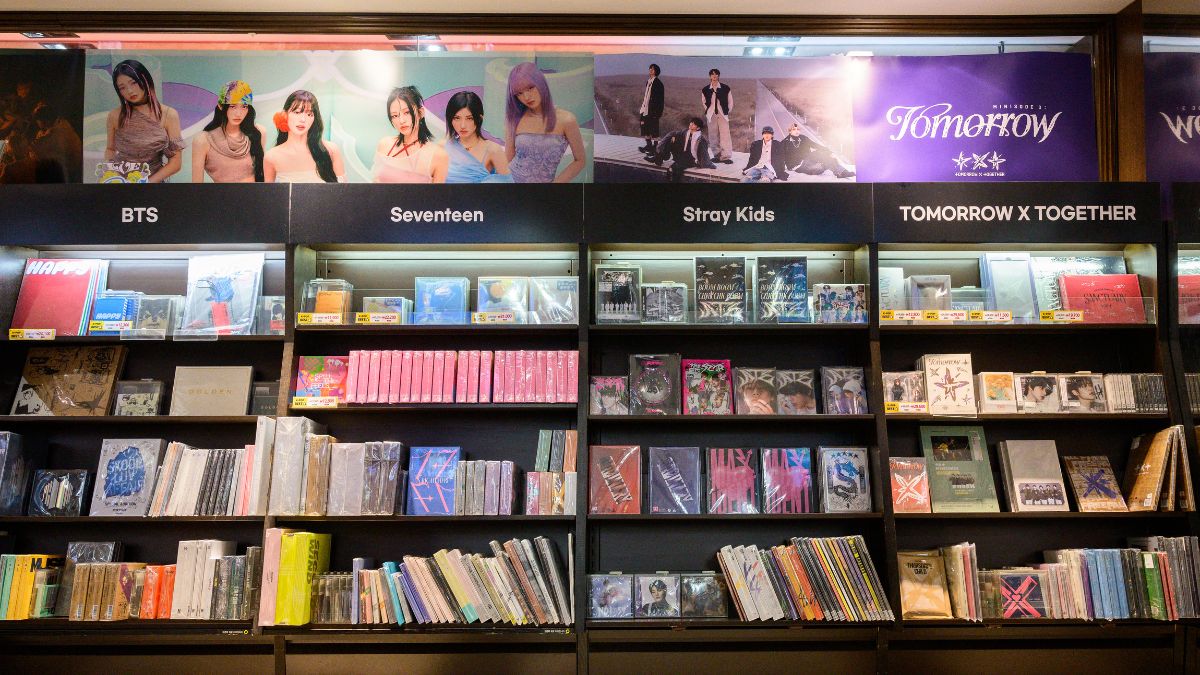South Korean pop has become a worldwide phenomenon in recent years. K-pop bands like BTS and BLACKPINK have gained global popularity, becoming top-selling artists in the country.
Despite K-pop stars smashing records, the music industry’s growth has stagnated. Some even say that K-pop “is in crisis.” But why?
We will explain.
K-pop industry’s growth stalls
After skyrocketing growth during COVID-19, the K-pop industry is facing challenges for the past few years.
Ssales of physical albums declined for the first time in nine years in 2024, as per a Korea Joongang Daily report.
Data from the Korea Music Content Association’s (KMCA) Circle Chart has revealed that physical album sales dropped to 98.9 million units last year from 120.2 million in 2023.
Exports of albums have also been hit. Last year, album shipments reached $291.8 million, only a 0.55 per cent rise from $290.2 million in 2023. This is a significant slowdown since the COVID-19 pandemic when album exports surged from $74.6 million in 2019 to $136.2 million in 2020, $220.9 million in 2021, and $231.4 million in 2022.
At $89.8 million, Japan again topped the list as the largest export market for K-pop albums. The United States was the second largest at $60.3 million and China at $59.8 million.
China saw a 76.4 per cent increase in exports despite Beijing’s de facto ban on Korean pop culture products, while Japan witnessed a 24.7 per cent fall, as per The Korea Bizwire report.
Why are album sales down?
Several factors are responsible for the K-pop industry’s headwinds. Industry experts attribute the decline in album sales to a dip in aggressive marketing tactics such as first-week sales competitions and limitless fan signing events, which have received criticised.
As per The Korea Bizwire, the 2024 Summer Olympics in Paris also took away attention from K-pop releases during the time usually considered a peak season for the industry.
This shrunk operating profits for major entertainment companies like HYBE and SM in the third quarter and an operating loss for YG Entertainment.
Is K-pop industry in ‘crisis’?
In 2023, Bang Si-hyuk, founder and Chairman of HYBE, the entertainment giant behind BTS, said that K-pop “is in crisis” with major entertainment companies accounting for just 2 per cent of global music record and streaming sales.
One of the reasons for the slowdown was the hiatus of the globally popular boy band BTS as a group. In June 2022, the seven-member band announced a break to fulfil mandatory military service.
“The biggest influence of BTS is that they increased K-pop’s dependency on the overseas market and made it truly a part of the global popular music market,” Lee Gyu-tag, an associate professor at George Mason University Korea who has studied the globalisation of K-pop, told NPR.
However, only BTS’ absence is not troubling the K-pop industry. South Korean pop’s popularity on the global music stage has not been reflecting in its share prices.
South Korea’s “Big Four” K-pop agencies – Hybe Corporation, M Entertainment, JYP Entertainment and YG Entertainment – saw their stock performance tumble last year.
By September 2024, Hybe shares fell 29 per cent, SM plunged 36 per cent, YG lost 37 per cent and JYP Entertainment declined 56 per cent.
Kim Gyuyeon, financial analyst at Mirae Asset Securities, told CNBC that physical album sales have historically made up the largest part of a record label’s revenue and been the most profitable segment.
As physical album sales plunge, they not only impact earnings but also spook investors. “A physical album is useless and even a burden because it occupies space. [This means that] despite all these disadvantages, people who buy it are huge fans of the artist, who [also] spend a lot of money,” Kim explained.
Despite a rise in K-pop streaming, it only contributes to a small part of these agencies’ revenue, the financial analyst said.
The controversies involving K-pop artists and their agencies have also led to a fall in stock performance as the public image and activities of the stars and executives of these record labels and entertainment companies influence their share prices, reported The Korea Times.
“The dispute between HYBE and ADOR as well as K-pop idols causing issues brought a feeling of fatigue to the public,” as per report from the Korea Creative Content Agency released last year.
While music critic Kim Yoon-ha does not agree that the two are directly related, she noted that negative publicity is a “definite downside for the industry”. “It can be a decisively negative factor that can affect K-pop demand in the long run,” Kim told The Korea Joongang Daily.
BTS, BLACKPINK’s comebacks give hope
The K-pop industry has put hope on BTS’ return this year and BLACKPINK’s comeback to revive its fortunes.
BTS’ Jin and J-Hope have finished their mandatory military service, while the rest of the members will be done in June.
BLACKPINK plans to work on new songs in the coming months and kickstart a world tour this summer, as per the Yonhap News Agency.
Many new K-pop groups are also slated to make their debut, including boy group KickFlip, girl group Hearts2Hearts and British boy band Dear Alice.
“To sustain growth in the K-pop market, we need to expand beyond core fandoms and attract casual fans who sit between dedicated fans and the general public. Ultimately, it’s about broadening appeal to the mainstream audience,” Kim Jin-woo, chief researcher at Circle Chart, said, as per The Korea Bizwire.
It remains to be seen whether the comebacks of K-pop stars, concerts and the launch of new artists will reverse the market slowdown, bringing back the upward trajectory of the pandemic years.
With inputs from agencies


)

)
)
)
)
)
)
)
)



